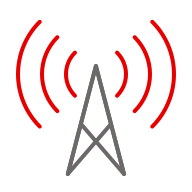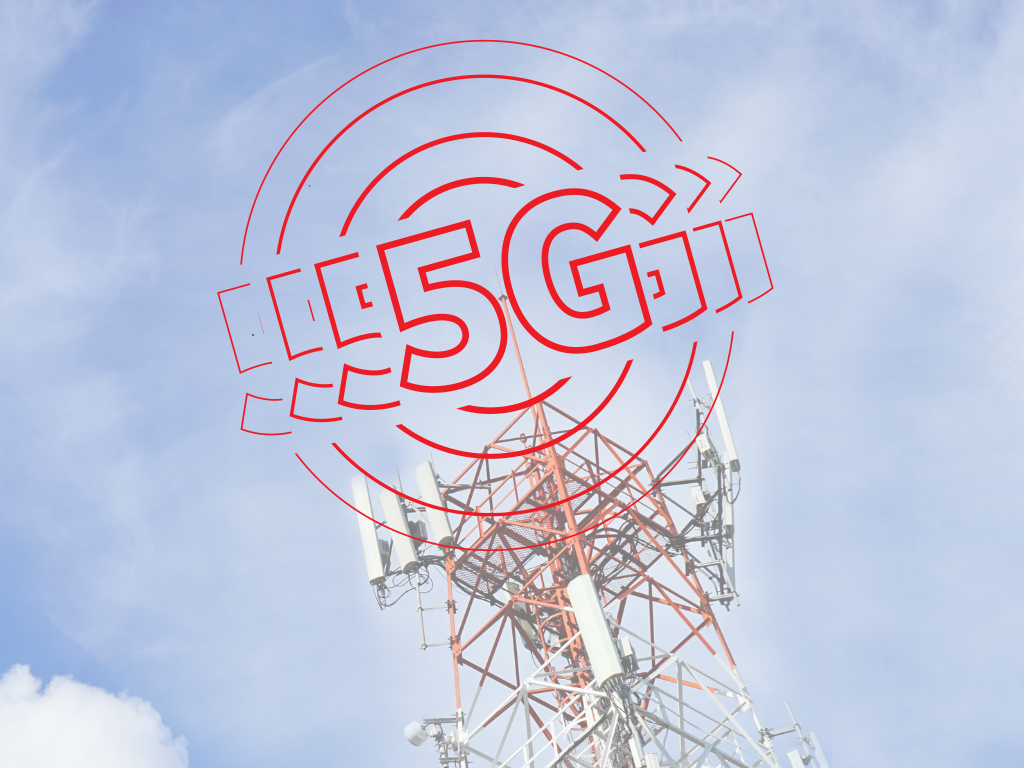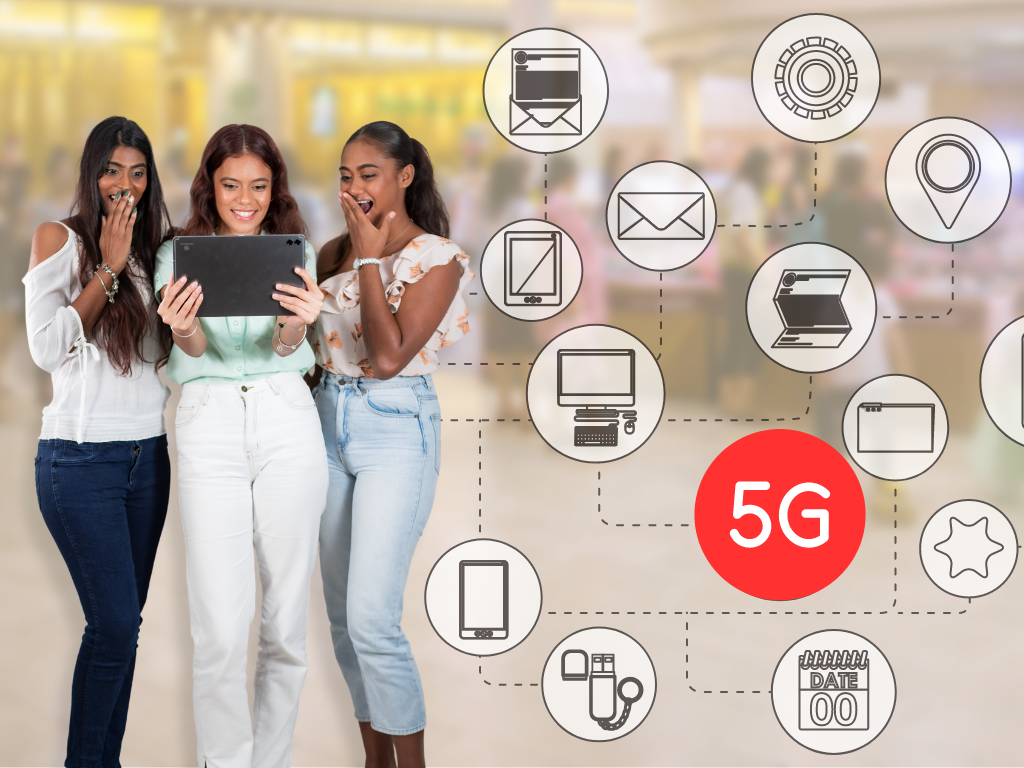5G stands for fifth generation and is the next generation forward in wireless mobile network technology. 5G is the evolution of mobile networks building upon the foundation and success of 2G, 3G, and 4G.

5G is faster. 5G is up to 10 times faster than 4G. Peak speeds can reach over 1Gbps depending on device capability and 5G network coverage in the location. 5G allows mobile network speeds to be faster than ever, which can contribute to higher quality streaming, faster gaming and more real-time connectivity.

5G has lower latency. There is virtually very little to no lag time when using a 5G capable device connected to a 5G network. 5G has the potential to decrease the time it takes for connected devices to communicate with each other across the network. Low latency equals better performance with closer to real time response.

5G has an increased network capacity capable of keeping more people connected online at the same time. 5G can handle lots of people and devices accessing the 5G network simultaneously, even in crowded areas like towns or major events.

In the right conditions, 5G is up to 10 times faster than 4G. Download speeds can reach 1Gbps depending on device capability and 5G network coverage in a particular the location.
5G’s latency can be four to five times less than that of 4G.
5G can support up to 100 times as many devices and endpoints as 4G. This means 5G is ready to support the next generation of user growth and the millions of IoT devices expected to come online in the near future.
5G is not a replacement of 4G. In fact, 5G will work alongside and co-exist with 4G, 3G and 2G to ensure services such as voice and SMS continue to work.
Vodafone Fiji’s 5G live user trials will be conducted in select parts of Suva CBD and will be further expanded to the greater Suva area in the coming months. The following are specific areas in parts of Suva where Vodafone’s initial 5G network will be available:
• Suva City – Central Business District
• Walu Bay
• Samabula
• Tamavua
• Namadi
• Flagstaff
• Laucala Bay
• Vatuwaqa
• Raiwaqa
• Nabua
Vodafone Fiji is working round the clock to further expand its 5G network and coverage areas for commercial launch.


To access 5G in the Pilot 5G Network: To access 5G services, a user will need a 5G capable device, be in the 5G coverage area in Suva, and be selected to trial 5G services. Pilot users will be selected from different segments of our customer base and 5G will be provisioned for this user group in a test environment.
To access 5G in the Commercial Network: To enjoy Vodafone’s 5G services when the commercial 5G network is launched, a user will need a 5G capable device, be in a 5G coverage area and ensure that the device software is up-to-date.
NB: Some devices might require a software upgrade which will directly get pushed to the phone from the device manufacturer. In Settings: If there is an option to change the Network Mode to 5G or 5G/4G/3G, and the 5G bands supported are n41 and n78, then the device is compatible with Vodafone’s 5G network.
8. When will Vodafone launch 5G? What can we expect from Vodafone’s 5G Live User Trials period?
For now, Vodafone has been granted a 5G non-commercial license by the Fiji Government to operate and undertake rigorous end user tests in the pilot 5G network before full commercial license is issued later this year. This means Vodafone’s current 5G offering is in a pilot area in Suva with a selected group of users.
With these users, Vodafone will undertake end-to-end 5G testing to ensure 5G services & use cases are demonstrated and showcased in real scenarios. This also ensures that all issues are ironed out and resolved before the commercial launch.
Follow Vodafone Fiji’s social media channels to be notified on when the Vodafone 5G network will launch commercially.
9. What are the main use cases of 5G?
Vodafone Fiji’s main driver for 5G for the customers is based around enhanced mobile broadband (eMBB) type services. This means majority of the initial use cases for 5G will be based around high-speed mobile broadband service using smartphones and Wi-Fi enabled routers in mobile as well as stationary (home & office) scenario.
With 5G enhanced broadband, it is anticipated that a boom will be experienced in online streaming, media & content exchange, and online gaming as faster data speeds reduces the time for users to access these services.
The common user cases for Vodafone initial 5G pilot launch are:
10. What Is Needed by a Vodafone customer to access 5G?
To access 5G in the Pilot 5G Network: To access 5G services, a user will need a 5G capable device, be in the 5G coverage area in Suva, and be selected to trial 5G services. Pilot users will be selected from different segments of our customer base and 5G will be provisioned for this user group in a test environment.
To access 5G in the Commercial Network: To enjoy Vodafone’s 5G services when the commercial 5G network is launched, a user will need a 5G capable device, be in a 5G coverage area and ensure that the device software is up-to-date.
NB: Some devices might require a software upgrade which will directly get pushed to the phone from the device manufacturer. In Settings: If there is an option to change the Network Mode to 5G or 5G/4G/3G, and the 5G bands supported are n41 and n78, then the device is compatible with Vodafone’s 5G network.
11. How do I know that I have been selected to be a part of the 5G Live User Trials?
Vodafone will contact and notify you that you are eligible to trial the 5G Pilot Network.
12. Where is 5G available in the world? Does Vodafone Fiji offer 5G too?
5G networks are being rolled out globally where major urban areas have initial 5G coverage followed by an on-going network expansion to other areas. 5G is available in Australia, New Zealand, USA, Canada, India, China, Europe and is continually expanding. As at February 2024, Vodafone Fiji is testing 5G Services with a selected group of customers in the Suva area.
Follow Vodafone Fiji’s social media channels to be notified on when the Vodafone 5G network will launch commercially.
13. Where is Vodafone Fiji’s Pilot 5G Network coverage currently available?
Vodafone Fiji’s 5G live user trials will be conducted in select parts of Suva CBD and will be further expanded to the greater Suva area in the coming months. The following are specific areas in parts of Suva where Vodafone’s initial 5G network will be available:
• Suva City – Central Business District
• Walu Bay
• Samabula
• Tamavua
• Namadi
• Flagstaff
• Laucala Bay
• Vatuwaqa
• Raiwaqa
• Nabua
Vodafone Fiji is working round the clock to further expand its 5G network and coverage areas for commercial launch.
14. Which devices are capable and can be used in the pilot phase to trial 5G?
The Vodafone 5G network will be compatible with 5G-capable devices that support 5G bands of n41 and n78.
15. I have been selected to trial Vodafone’s 5G Pilot Network, what do I need to do?
You need to make sure that the APN on your device is set to “internet”, the network mode on your device is set to 5G and your Operating System software is updated to the latest version. You also need to be in a 5G coverage area to use 5G.
16. How fast is 5G? What speeds will be available on Vodafone Fiji 5G internet?
Enhanced Mobile Broadband (eMBB) 5G technology can theoretically achieve download speeds of up to 1Gbps (Gigabit per second), which is up to 10 times faster than 4G however the actual speed you will experience at any given time will vary depending on a number of factors including network (i.e., signal, proximity, line of sight, or congestion), location (i.e., modem placement, distance from the 5G tower, geography, obstructions), and other factors (such as weather, hardware, software).
Considering these factors, Vodafone Fiji’s average download speed per user can be between 100Mbps – 200Mbps as per current test spectrum license allocated by the Government.
17. What happens when I move outside of Vodafone 5G coverage area?
Active users moving from a 5G area to a non-5G area will be seamlessly handed over to the 4G network. This may cause a slight degradation in user experience, but users can continue to use Vodafone’s extensive 4G coverage.
18. What will happen when I make a voice call?
As 5G is data only network, when a user initiates a voice call in a 5G environment, the voice call will be transferred to a 2G, 3G, or 4G (VoLTE) network. Once the call is ended, the user will be transferred back to the 5G network.
19. Is 5G safe? Are there any health concerns related to 5G?
Mobile technology is highly regulated and operates within strict guidelines set by regulated independent bodies internationally.
5G like other wireless technology (2G/3G/4G) uses radio waves which have been used for mobile and Wi-Fi networks for decades. These have been tested by independent bodies such as World Health Organization (WHO) & International Commission on Non-Ionizing Radio Protection (ICNIRP) and there has been no evidence of harmful effects of 5G or other mobile radio waves to humans.
5G is safe to use.
1. What is 5G?
5G stands for fifth generation and is the next generation forward in wireless mobile network technology. 5G is the evolution of mobile networks building upon the foundation and success of 2G, 3G, and 4G.
5G is the next step of technological advancement in mobile networks and is designed to provide faster and more reliable broadband & internet communication. 5G technology promises faster, more reliable, and near-instant data connections that will universally connect people and “things”.
5G technology allows for faster data transfer speeds and is expected to be a key enabler of the development of new applications and services such as Internet of Things (IoT), augmented reality (AR), virtual reality (VR), advanced gaming and high definition (HD) live streaming.
2. What are the characteristics of the 5G ecosystem?
Globally, it has been seen that the following are the real characteristics and drivers for 5G:
1) Enhanced mobile broadband (eMBB): Including peak download speeds of at least 1 Gbps and a reliable 100 Mbps user experience data rate in urban areas.
2) Ultra-reliable and low latency communications (uRLLC): Including 1ms latency and very high availability, reliability, and security to support services such as AR, VR and connected vehicles.
3) Massive machine-type communications (mMTC): Including the ability to support at least one million IoT connections per square km with long battery life and extensive wide-area coverage.
For advanced economies like Japan, China, USA, and continental Europe, the 5G use cases are fully applicable for eMBB, uRLLC, and mMTC type applications.
The main ecosystem for Vodafone 5G will be eMBB. As our strategic investment in 5G matures in the near future, opportunity for mMTC will also be possible.
3. What advantages and benefits of 5G?
The 3 major advantages of 5G are that:
1) 5G is faster. 5G is up to 10 times faster than 4G. Peak speeds can reach over 1Gbps depending on device capability and 5G network coverage in the location. 5G allows mobile network speeds to be faster than ever, which can contribute to higher quality streaming, faster gaming and more real-time connectivity.
2) 5G has lower latency. There is virtually very little to no lag time when using a 5G capable device connected to a 5G network. 5G has the potential to decrease the time it takes for connected devices to communicate with each other across the network. Low latency equals better performance with closer to real time response.
3) 5G has an increased network capacity capable of keeping more people connected online at the same time. 5G can handle lots of people and devices accessing the 5G network simultaneously, even in crowded areas like towns or major events.
These advantages will enable users to do a variety of things through 5G, such as:
• Stream and download internet content faster with very minimal to no interruptions or buffering.
• Power future technologies like augmented reality (AR) and virtual reality (VR).
• Enhance IoT services and enable IoT devices to operate seamlessly.
• Accelerate development of “smart” use cases like smart homes, smart offices, and smart cities.
• Enable future advancement in other industries such as medicine & health care, public safety, education, manufacturing, retail, transportation, and agriculture.
4. What benefits does 5G offer to consumers?
5G can significantly improve the consumer experience by providing faster, more reliable connectivity and unlocking new possibilities for entertainment, communication, productivity, and lifestyle applications.
The main benefits of 5G include faster internet speeds, lower latency, support for a massive number of connected devices (IoT), and the ability to enable new technologies like augmented reality (AR) and virtual reality (VR).
These benefits will provide improved performance for applications like streaming and gaming, lower latency for real-time communication, and enhanced connectivity for the growing number of smart devices.
With faster internet speeds, reduced lag and quicker response times, you would be able to:
• Interact with smart home devices (IoT) like security cameras, lights, thermostats, and appliances, leading to a more seamless and responsive connected home environment.
• download movies and stream high-definition videos much faster and smoother.
• experience enhanced online gameplay with high-quality graphics, faster load times, and multiplayer gaming with reduced lag.
• download and update apps on smartphones almost instantly, saving you time and ensuring that you have the latest features.
• experience improved and clearer video calls, live streaming and video conferencing
• enjoy more realistic Augmented Reality (AR) and Virtual Reality (VR) applications, such as interactive sporting events, virtual travel experiences, or immersive educational content.
• travel with real-time traffic updates and faster route calculations.
• work remotely by participating in high-quality video conferences, sharing large files seamlessly, and accessing cloud-based applications.
5. What are the benefits of 5G for businesses?
With improved connectivity, enhanced data transfer speeds, and lower latency, 5G can enable businesses to create innovative solutions, optimize processes, and improve overall productivity.
You would be able to experience high-quality video conferencing and quickly upload and download large files such as high-resolution graphics, making collaboration more efficient.
6. How is 5G different from 4G?
In the right conditions, 5G is up to 10 times faster than 4G. Download speeds can reach 1Gbps depending on device capability and 5G network coverage in a particular the location.
5G’s latency can be four to five times less than that of 4G.
5G can support up to 100 times as many devices and endpoints as 4G. This means 5G is ready to support the next generation of user growth and the millions of IoT devices expected to come online in the near future.
5G is not a replacement of 4G. In fact, 5G will work alongside and co-exist with 4G, 3G and 2G to ensure services such as voice and SMS continue to work. 5G is currently only available for data use. When you make a call on your 5G capable device, the call will be transferred to the 4G or 3G network.
7. What is the difference between 3G, 4G and 5G?
3G, 4G and 5G are different generations of wireless internet technology. 3G introduced the world to internet browsing and video calls, while 4G introduced high speed internet for video streaming, working from home and enhanced productivity, With the rise in number of internet-reliant devices, applications, cloud computing, and new technologies such as AR and VR applications, 5G offers faster internet speeds, lower latency and greater capacity to offer real-time communication, connect more devices and provide reliable connectivity, thus enabling innovation and boosting productivity.
20. How does 5G achieve faster speeds?
5G achieves faster speeds through the use of advanced technologies such as millimetre-wave frequencies, Massive MIMO (Multiple Input, Multiple Output), and beamforming. These technologies enhance data transfer rates and overall network efficiency.
21. How does lower latency benefit users in 5G networks?
Lower latency in 5G networks results in reduced response times, making activities like online gaming, video conferencing, and real-time applications more responsive and seamless.
22. What advantages does 5G bring to video streaming and online gaming?
5G's faster speeds and lower latency enhance video streaming quality, reduce buffering, and provide a smoother online gaming experience. Users can enjoy high-definition content and real-time multiplayer gaming with minimal lag.
23. How would 5G work with smart devices, accessories, IoT, etc?
With greater capacity and reduced latency, smart devices and IoT will be able to transfer large data packets and respond in real-time thus ensuring a seamless user experience.
24. What can I do if my area does not have 5G coverage yet?
If 5G is not yet available in your area, you will still be able to use 4G and other existing networks.
25. Will I need to upgrade my current device to use 5G?
If your device is compatible with 5G, then you do not need to upgrade your device to 5G. If your device does not support 5G, then you will need to upgrade to a 5G-compatible device supporting 5G bands of n41 and n78. Many new smartphones and devices are being released with built-in 5G capabilities. Check with your device manufacturer or call Vodafone’s Customer Care on 124 to ensure compatibility.
26. Is my device compatible with Vodafone Fiji’s 5G Network?
Most 5G devices supporting 5G bands of n41 and n78 will be compatible with Vodafone Fiji’s 5G network. Some devices might require a software upgrade which will directly get pushed to your phone from your device manufacturer. Please ensure you install the update to make your phone 5G-ready.
27. What are the cheapest phones that Vodafone Fiji sells that will be 5G-capable?
As at February 2024, the cheapest phones are TCL 40 NXTPAPER 5G at $549 and Samsung Galaxy A34 5G at $899.
28. What are the list of devices sold by Vodafone Fiji that support 5G?
Below are a list of devices that support 5G:
| Apple |
|---|
| iPhone 12 Mini |
| iPhone 12 |
| iPhone 12 Pro |
| iPhone 12 Pro Max |
| iPhone 13 Mini |
| iPhone 13 |
| iPhone 13 Pro |
| iPhone 13 Pro Max |
| iPhone 14 |
| iPhone 14 Plus |
| iPhone 14 Pro |
| iPhone 14 Pro Max |
| iPhone 15 |
| iPhone 15 Plus |
| iPhone 15 Pro |
| iPhone 15 Pro Max |
| Samsung |
| Galaxy A34 |
| Galaxy A54 |
| Galaxy S20 Ultra |
| Galaxy S21 |
| Galaxy S21+ |
| Galaxy S21 Ultra |
| Galaxy S22 |
| Galaxy S22+ |
| Galaxy S22 Ultra |
| Galaxy S23FE |
| Galaxy S23 |
| Galaxy S23+ |
| Galaxy S23 Ultra |
| Galaxy S24 |
| Galaxy S24 Ultra |
| Galaxy Z Flip3 |
| Galaxy Z Fold3 |
| Galaxy Z Flip4 |
| Galaxy Z Fold4 |
| Galaxy Z Flip5 |
| Galaxy Z Fold5 |
| Galaxy Tab A9+ |
| Galaxy Tab S8 |
| Galaxy Tab S8+ |
| Galaxy Tab S8 Ultra |
| Huawei |
| Huawei P40 |
| Huawei P40 Pro |
| Huawei P50 Pro |
| Huawei P50 Pocket |
| TCL |
| TCL 40 NXTPAPER 5G (T771K3) |
29. How can I prepare for 5G?
To prepare for 5G, ensure that your device is 5G compatible, you are in a 5G coverage area, and your device software is up-to-date.
30. I am in a 5G coverage area and I have a 5G-enabled device, but I am still not able to use 5G. What do I do?
Vodafone’s current 5G offering is in a pilot area in Suva with a selected group of users. If you are a part of this test group, you may update your Operating System software or restart your device or change the network mode to 5G.
To change the network mode, Open Settings and search for Network Mode. Select the 5G option to change the network mode to 5G.
If you are not a part of the test group, then you will only be able to use 4G and other existing networks. Follow Vodafone Fiji’s social media channels to be notified on when the Vodafone 5G network will launch commercially.
If you are a part of the test group and you still cannot connect to the 5G Network, please contact our customer care by chatting with us online, calling 124 (for Prepay) or 125 (for Post-pay).
31. Is 5G available to both Prepay and Post-pay users?
Yes, Vodafone’s 5G internet service is available on both Prepay and Post-pay provided that you are
selected to be part of the 5G public trial, have a 5G-enabled device, you are located in a 5G coverage
area and your device software is up-to-date
32. How does 5G support the Internet of Things (IoT)?
5G is designed to connect a vast number of devices simultaneously, making it a crucial enabler for the IoT. It provides the capacity and efficiency required to support smart devices, sensors, and other IoT applications across various industries.